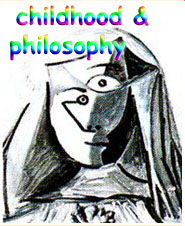philosophy with children as a transforming experience. a proposal in non-profit organizations
DOI:
https://doi.org/10.12957/childphilo.2019.42276Keywords:
life experience, philosophy for/with children, lipman, romano, zambranoAbstract
The benefits of implementing the methodology of Philosophy for/with Children are clear. Nevertheless, an excessive emphasis on critical thinking skills weakness its application in groups at risk of social exclusion. These groups require a profound transformation and not just a better way of thinking. This is due to the cognitive dissonance provoked when one only works with discourse: session participants can learn to give good answers without becoming able to apply them outside of philosophical settings. One way to address this limitation is to design an experiential reason, something described, in part, by Mathew Lipman (2003, pp. 261-270). If life experience determines children’s identity construction (Romano, 2012; Nishida, 1995; Zambrano, 1995), it is crucial to investigate its meaning and how it is articulated. Therefore, an Experiential Philosophy with Children, the topic of this paper, does not focus exclusively on the discursive work rooted in critical thinking. Rather, it is based on three pillars: (1) the creation of experiential exercises, (2) the promotion of provisions that encourage the transformative capacity of these exercises, and (3) the design of experiential scenarios and metaphors that promote the attainment of transformative truths. This article describes the limitations of the cognitive approach of philosophical work with children, summarizes the bases of experientiality, and adds a brief appendix on the work done at the University of Seville in non-profit associations like the Maparra Project of Caritas.References
Autores varios, Experiencia de la vida, Alianza, Madrid, 1966.
ANDERS, V. (ed.): Etimologías de Chile, Santiago de Chile, 2001-2019, recuperado de http://etimologias.dechile.net/PIE/?per-5, último acceso 27 de abril de 2009.
ANTONOV, V. (ed.): Tao Te Ching, Lulú, Ontario, 2008.
ANTÓN PACHECO, J.A.: El ser y los símbolos, Mandala, Madrid, 2010.
ARRIANO: Disertaciones por Arriano, Gredos, Madrid, 1993.
BARRIENTOS-RASTROJO, J.: “Abrir preguntas esenciales como quehacer del maestro. De la quiebra de la pedagogía bancaria de Freire a la pregunta esencial gadameriana y al saber de la experiencia zambraniana”, Diálogo filosófico, 2013(86), pp. 325-352.
BARRIENTOS-RASTROJO, J.:“An Experience workshop with groups. Theory and practice” en Weiss, M.N. (ed). The Socratic handbook, Lit Verlag, Zürich, 2015, pp. 375-383.
“El rostro de la experiencia desde la marea orteguiana y zambraniana”, Revista Endoxa, revista de la Facultad de Filosofía de la UNED, 2010, número 25, pp. 279-314.
BARRIENTOS-RASTROJO, J.:“La experiencialidad como respuesta a la tendencia analítica de la filosofía para niños”, Childhood&Philosophy, 12 (25), 2016, pp. 519-542.
BARRIENTOS-RASTROJO, J.: “La fisiología del saber de la experiencia y los frutos de su posesión”, Themata, número 44, 2011, pp. 79-96.
BARRIENTOS-RASTROJO, J.:“La obcecación creencial y su tratamiento por medio de la comun(ica)ción experiencial y de la palabra invocadora”, Ilu, 23, 2018, pp. 13-30.
BARRIENTOS-RASTROJO, J.: Los símbolos desfallecidos, Analogía Filosófica, número especial 36, México DF, 2015.
CARRERAS, C.: “Filosofía para Niños: el desarrollo global de la habilidades de pensamiento” en Barrientos-Rastrojo, J.: Filosofía para niños y capacitación democrática freiriana, Liber Factory, Madrid, 2013, pp. 91-113.
COMTE-SPONVILLE, A.: El amor. La soledad, Paidós, Barcelona, 2000.
BENJAMIN, W.: Discursos interrumpidos I, Taurus, Madrid, 1973.
BRENIFIER, O.: Filosofar como Sócrates, Diálogo, Valencia, 2011
La práctica de la filosofía en la escuela primaria, Diálogo, Valencia, 2012.
DE PUIG, I. – SÁTIRO, A.: Jugar a pensar. Recursos para aprender a pensar en educación infantil (4-5 años), Octaedro-SEP, Puebla, 2008.
DEWEY, J.: Arte como experiencia, Paidós, Barcelona, 2008.
ECHEVERRÍA, E.: Filosofía para niños, SM, México DF, 2006.
ESQUIROL, J.M.: La resistencia íntima, Acantilado, Barcelona, 2015.
GADAMER, H.G.: La actualidad de lo bello,Paidós, Barcelona, 1991.
GADAME, H.G: Verdad y método I, Sígueme, Salamanca, 2000.
HUME, D.: La norma del gusto y otros ensayos, Ediciones 69, Barcelona, 1989.
JAMES, W.: Las James, W.: Las variedades de la experiencia religiosa, Península, Barcelona, 1994.
JAUSS, H.R.: Pequeña apología de la experiencia estética, Paidós, Barcelona, 2002.
KOHAN, W.: El maestro inventor, Ediciones del Solar, Caracas, 2016.
KOHAN, W.:Infancia y filosofía, Progreso, México DF, 2009.
KOHAN, W.:Viajar para vivir: ensayar, Dávila, Buenos Aires, 2015.
KOHAN, W. – WAKSMAN, V.: Filosofía para Niños. Aportes para el trabajo en clase, Noveduc, Buenos Aires, 2000.
LARROSA, J.: Tremores, Autêntica, Belo horizonte, 2014.
LIPMAN, M.: Philosophy goes to school, Temple University Press, Philadelphia, 1988.
LIPMAN, M.: Thinking in education, Cambridge University Press, Cambridge, 2003.
LIPMAN, M. - SHARP, A. - OSCANYAN, F.S.: La filosofía en el aula, Ediciones de la Torre, Madrid, 1998.
MENDONÇA, D.: Brincar a pensar. Manual de filosofía para crianças, Plátano, Lisboa, 2011.
NISHIDA, K.: Indagación sobre el bien, Gedisa, Madrid, 1995.
ORTEGA Y GASSET, J.: Obras completas 5, Alianza, Madrid, 1994a.
Obras completas 8, Alianza, Madrid, 1994b.
PANIKKAR, R.: Iconos del misterio. La experiencia de Dios, Península, Barcelona, 2001.
ROMANO, C.: El acontecimiento y el mundo, Sígueme, Salamanca, 2012.
SÁNCHEZ ALCÓN, J.M.: Pensamiento libre para personas con discapacidad intelectual, Pirámide, Madrid, 2011.
TORRE, J.M de la: “Experiencia cristiana y expresión estética en los sermones sobre el Cantar de los cantares” en San Bernardo: Obras completas de San Bernardo V. Sermones sobre el Cantar de los cantares, BAC, Madrid, 1987, pp. 3-75.
YALOM, I.: Quando Nietzsche Chorou, Saída de Emergencia, Parede, 2007.
ZAMBRANO, M.: La confesión: género literario, Siruela, Madrid, 1995.




